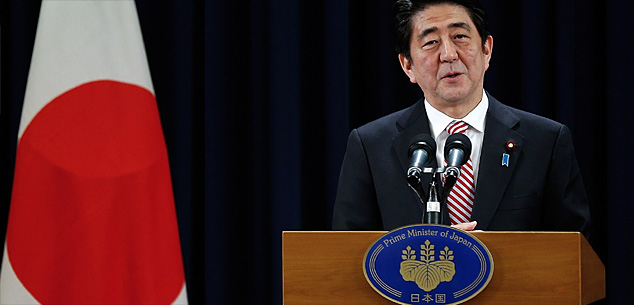
Before I get started today, I just wanted to tell you about something special I’m really quite excited about this week – we’ve got an exclusive series of interviews with Hugh Hendry, one of the best-known hedge fund managers around.
I’ve seen a rough cut of Hugh talking to Merryn about his current investment views – all I can say is, you won’t want to miss them.
We’re expecting the first video to go live within the next couple of days – perhaps even tomorrow. We’ll let you know as soon as they’re ready.
Anyway – among many other things, Hugh gives his views on Japan.
I won’t spoil it for you. But they might be particularly pertinent now that the country has published yet another woeful GDP reading.
Will Japan ever get a break? Here’s why I’m optimistic – from an investors’ point of view, at least…
Trading fiscal credibility for the promise of growth
Japan’s third-quarter GDP figure was awful. Merryn talked about it on her blog yesterday.
But in short, if the rather unreliable early reading is to be believed, Japan’s economic growth tanked. And everyone’s blaming it on the recent rise in the Japanese equivalent of VAT.
As Merryn points out, the point of putting up the sales tax is to maintain Japan’s fiscal credibility. The country is very heavily indebted. So the idea is that if it doesn’t at least make some sort of effort at raising more tax, investors will lose faith in the government and will stop being willing to buy its debt. If that happens, interest rates will rise, and the economy will be in even more trouble.
Of course, you could have said this about Japan at any point over the last goodness-knows-how-many years, says Matthew C Klein on the FT Alphaville blog this morning.
And Klein raises another very interesting point. Even although Japanese public debt has soared, private debt (as a percentage of GDP) has fallen sharply. Back in the late 1980s, near the peak of the boom, total private sector credit amounted to nearly 180% of GDP. It’s now down to around 130%.
• This article is taken from our free daily investment email, Money Morning. Sign up to Money Morning here.
As Klein puts it, this “achievement has been all the more remarkable considering that nominal incomes have been essentially flat over that period.” In other words, Japan hasn’t done this the ‘easy’ way – via inflation.
Also, while Japan remains among one of the most indebted countries in the world, its “total debt burden has increased less than in most rich countries”. In fact, a somewhat unnerving chart on the FT piece shows that by the middle of 2011, Britain’s overall indebtedness was on a par with Japan’s.
In short, if Japan’s biggest debt problem is government debt, then arguably the solution is to get the private sector spending and growing again. The tax take rises naturally, you pay off the government debt with a combination of growth and inflation, and everyone’s happy.
A snap election is on the cards
And that seems to be Shinzo Abe’s plan. Abe looks set to confirm that he’s going to delay a future planned sales tax hike until April 2017. It was originally planned for October 2015.
On top of that, Abe has also called a snap election. What’s the point of doing that? After all, he’s only been in power for a couple of years.
The idea is mainly to prove that the voters are still behind his plan, and to show that they approve of him delaying the tax hike and printing money. In effect, it’s a bit of ‘whatever it takes’-style showmanship – just as Europe’s Mario Draghi keeps talking about how he’s going to print money, Abe is trying to maintain the PR momentum behind Abenomics.
The difference, of course, between Japan and Europe, is that Abenomics also has a practical side, as well as a propaganda side. He’s actually doing something. He’s staked his political legacy on making this a success – as has the Bank of Japan’s current governor – and that’s why I’m happy to stick with Japan. Because they really will do whatever it takes, regardless of how extreme it might seem.
If you want to know the best ways to buy into the market, check out our recent MoneyWeek magazine cover story on the topic.